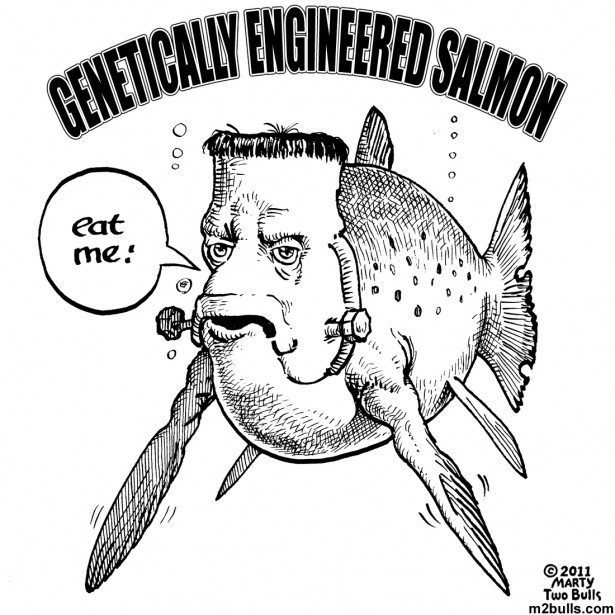Submitted by Rebekah Wilce on
 The extended comment period on the U.S. Food and Drug Administration (FDA) review and approval of AquAdvantage genetically engineered (GE) salmon ends April 26. As more comments flood in, the Center for Food Safety (CFS) reports that documents disclosed through a Freedom of Information Request (FOIA) "raise serious questions about the adequacy of the FDA's review of the AquAdvantage Salmon application."
The extended comment period on the U.S. Food and Drug Administration (FDA) review and approval of AquAdvantage genetically engineered (GE) salmon ends April 26. As more comments flood in, the Center for Food Safety (CFS) reports that documents disclosed through a Freedom of Information Request (FOIA) "raise serious questions about the adequacy of the FDA's review of the AquAdvantage Salmon application."
As the Center for Media and Democracy (CMD) has reported, the FDA's science was already "fishy." Now these documents reveal that while the FDA refused to look at the environmental impacts of these genetically manipulated fish outside of the Canadian and Panamanian facilities the application proposed, it appears that the U.S. Fish and Wildlife Service was already receiving requests to import AquAdvantage Salmon eggs into the U.S. for commercial production.
Responding to this revelation, Andrew Kimbrell, executive director of CFS, asked if "the whole idea of growing these genetically engineered salmon in Panama was a regulatory ruse by the company designed to get approval, while their real intent was to sell these eggs to U.S. companies to be grown in U.S. facilities."
Meanwhile, CFS claims that nearly 1.5 million people have commented in opposition to approval of GE salmon between the initial comment period in the fall of 2010 and so far during the comment period that ends at midnight on April 26. A 2010 survey commissioned in 2010 found that "78 percent of adults believe the FDA should not approve the genetically engineered salmon for human consumption." Grocery stores including Trader Joe's, Aldi, Whole Foods, and Marsh (representing more than 2,000 stores in the United States) have committed not to sell GE fish even if it is allowed on the market. And more than 260 chefs have joined Chefs Collaborative, a nonprofit network of chefs devoted to a sustainable food supply, in objecting to the transgenic fish.
Wenonah Hauter is the executive director of Food and Water Watch, author of Foodopoly, and a recent guest of CMD's Food Rights Network in Madison, Wisconsin. Hauter emphasized that the "FDA needs to put interests of the public ahead of those from the biotech industry, which appear to be GE salmon's only proponents. FDA must put an end to this regulatory mess and acknowledge that the environmental risks and lingering food safety issues don't justify approving this product."
Food and Water Watch urges those in opposition to the introduction of GE fish to comment on the FDA's approval of AquAdvantage GE salmon here.
Congress is considering two pieces of legislation that would affect GE salmon:
PEGASUS Act "to Prevent the Escapement of Genetically Altered Salmon" Introduced to Congress
Congressmen Jared Huffman (D-CA), Don Young (R-AK), and Mike Thompson (D-CA) this week introduced the "Prevention of Escapement of Genetically Altered Salmon in the United States (PEGASUS) Act," H.R. 1667, to block the introduction of GE salmon to the American diet and to waterways. It is a companion bill to S. 246, which was introduced by Senator Mark Begich (D-AK) in February 2013.
"We need to keep genetically engineered salmon out of our oceans, rivers and streams -- and off of our dinner plates," Congressman Huffman said in a statement. "GE salmon pose a danger to our wild salmon population, the ecosystems they live in and our commercial fisheries, and this bill is an important step towards protection of our families and coastal communities."
Supporters of the bill can email their members of Congress here.
GE Labeling Bill Introduced
In addition to the above proposed legislation, Senator Barbara Boxer (D-CA) and Congressman Peter DeFazio (D-OR) this week introduced the "Genetically Engineered Food Right-to-Know Act," bipartisan legislation that would require the FDA to clearly label GE foods -- including fish -- so that consumers can make informed choices about what they eat. The Senate version is here and the House version is here.
"Americans have the right to know what is in the food they eat so they can make the best choices for their families," Senator Boxer said in a statement. "This legislation is supported by a broad coalition of consumer groups, businesses, farmers, fishermen and parents who all agree that consumers deserve more -- not less -- information about the food they buy."
Supporters of the right to know if food is genetically engineered can email their members of Congress here.

Comments
Anonymous replied on Permalink
your mantra is "reporting on spin and disinformation"?
Anonymous replied on Permalink
You say people need to "stop
Anonymous replied on Permalink
If GMOs are so great...
Anonymous replied on Permalink
..and where do you get your information from, "Mr./Mrs informed"
Stesha replied on Permalink
I agree- if GMO salmon is
Anonymous replied on Permalink
And your comment is nothing
Anonymous replied on Permalink
Everyone is ignorant